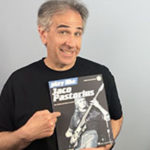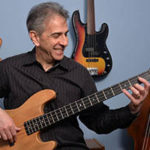“Keep it fluid so that it is subconscious rather than conscious”
By Jon Liebman
October 28, 2022
Here we go again. Over the years, I’ve heard from countless wannabe bass players, proudly exclaiming that they’re “learning all their scales and modes” just because that’s what they were told to do.
This is especially true with many of the older bassists I work with, the ones with the great attitudes. Generally, people over 50 have the life experience, the maturity, and the discipline to know how to focus on accomplishing a specific goal, in this case, learning bass. I love seeing that kind of focus and diligence.
Do you know why you’re learning your scales and modes?
Becoming proficient with your scales and modes is great. But don’t stop there. As I’ve asked many times: Do you know what you’re supposed to do with all those notes? Do you know how to apply them so that you’re actually making music with them?
The subject came in a recent conversation I had with renowned educator Patrick Pfeiffer, published at this week’s FBPO interview. Patrick is the author of Bass Guitar for Dummies and a great bass player in his own right.
“When we play music,” Patrick says, “when it’s just right, it’s like a musical nirvana. There is this moment of absolute musical bliss. And that’s why we play music.”
Learning bass technique is a means to an end
It’s important not to lose sight of the fact that learning bass technique is a means to an end. Technique for technique’s sake is pointless. It’s about the music.
“The older guys, they sense that,” Patrick continues. “It’s like that kind of high just comes from hitting the right vibration, the right groove, the right everything, when everything just lines up. Everybody’s in the same good mood. The world disappears and everything is beautiful. I think that’s what the older cats go for.”
So, how do you get there? I asked.
Get your brain out of the way
“The way to get there is with a very efficient practice method,” Patrick says, “and then having this under your fingers so well that you don’t have to think about what your hand has to do. There’s a deep muscle memory involved. I think that is the thing to strive for here. You get your technique out of your way and you get your brain out of the way.”
Learning bass technique is not a one-and-done kind of thing, though. The same goes for learning music theory. You need to keep on top of those things in order to do a better job of expressing yourself musically. According to Patrick, it’s where discipline meets creativity.
“I have a practice routine that I do to this day,” he says. “I know my theory but I have to keep it fluid so that it is subconscious rather than conscious.”
Practice what you suck at!
When you’re practicing, don’t play what you know; play what you don’t know. Incorporate that new stuff into your musical vocabulary, your subconscious. Then start the cycle again.
“A very inefficient thing is to practice the stuff you’re good at,” Patrick says. “Pick the stuff that you suck at! It’s different for everybody.”
How well are you assessing what you’re good at and what you need to work on? Maybe it’s knowing how to apply your scales and modes or maybe it’s something else. You’ll get much better results if you follow a plan specifically targeted at solving those bass-playing problems and reaching those bass-playing goals.
Know what you need to work on. Then do it!
At For Bass Players Only, students in the Bottom Line Club start by finding their stage in my “Growth Track” spectrum and following specific action items in order to reach those milestones.
“Basically, you got to take care of business,” Patrick says, “and then you can express yourself better. So that’s how I would approach the older crowd.”
Your turn. When you’re over 50, you want to find the most efficient way to get where you’re going, including your desire to learn bass. How are you juggling that balance between learning bass technique and expressing yourself musically? Leave a comment below and share your story. And be sure to watch my interview with Patrick here.





